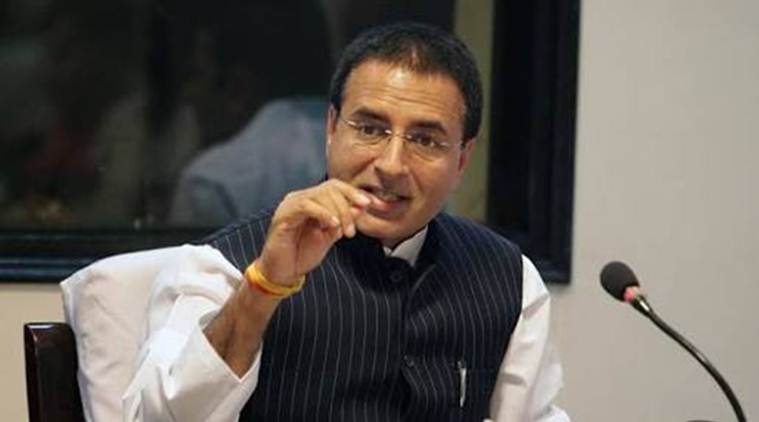 Congress spokesperson Randeep Singh Surjewala.
Congress spokesperson Randeep Singh Surjewala.
From anxiety and trepidation to a sense of relief, the mood in the Congress swung from one extreme to another before and after the speech of former President Pranab Mukherjee at the RSS headquarters in Nagpur. The disquiet in the party triggered by Mukherjee’s move did not die down immediately, but the party chose to use the veteran’s speech to hide the discomfort, and argue that he had shown the “mirror of truth” to the RSS and ask whether it would learn the lesson.
Minutes before Mukherjee began his speech came a tweet from senior Congress leader Anand Sharma. “The images of Pranab da, veteran leader and ideologue at RSS Headquarters have anguished millions of Congress workers and all those who believed in pluralism, diversity and the foundational values of the Indian Republic… Dialogue can only be with those who are willing to listen, absorb and change. There is nothing to suggest that the RSS has moved away from its core agenda as it seeks legitimacy,” he said. Hours earlier, Ahmed Patel, close aide of Sonia Gandhi, had said, “I did not expect this from Pranab da !”
Ever since it became known that Mukherjee would attend the RSS event, many Congress leaders including Jairam Ramesh and Ramesh Chennithala had requested him to refrain from going to Nagpur. Some like M Veerappa Moily had berated him. The Congress had not reacted officially, rather letting individual leaders voice their opinion.
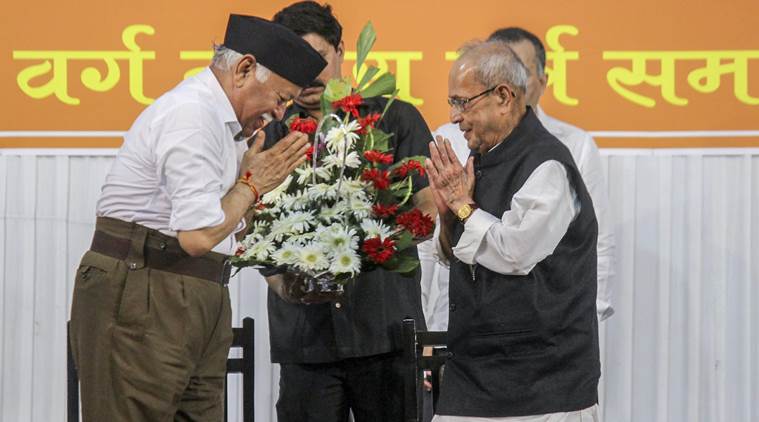 Former president Pranab Mukherjee being welcomed by Rashtriya Swayamsevak Sangh (RSS) chief Mohan Bhagwat in Nagpur. (PTI Photo)
Former president Pranab Mukherjee being welcomed by Rashtriya Swayamsevak Sangh (RSS) chief Mohan Bhagwat in Nagpur. (PTI Photo)
But soon after the speech, the mood subtly shifted and the party went into damage control mode. “Pranab Mukherjee has shown the mirror of truth to the RSS at RSS headquarters in Nagpur by reminding them of India’s ‘pluralism’, ‘tolerance’, ‘secularism’ and ‘inclusiveness’ as an article of faith and soul of the country,” Congress communication department head Randeep Surjewala said in a statement. “Let the RSS and BJP publicly commit today to change its character, orientation, thought process and path and accept the sagacious advice of their guest.”
Sharma told The Indian Express that “Pranabji in a statesmanlike way, with clarity and conviction, has articulated his views on nation and nationalism, stressing on Indian civilization, its composite culture, pluralism and diversity which in essence is integral to our identity….”
“We had never had any doubt that Pranabji could be influenced or there is going to be any dilution in his ideological convictions and commitment. He is a veteran leader and idealogue and a student of history. He has said what he was expected to, reaffirming with clarity and firmness his conviction and his understanding, but whether the RSS is willing to not only listen but to absorb what he has said and change by shifting away from their core agenda and their ideology which is in conflict with what he has said… because they say one religion, one culture, one nation… they never talk of inclusiveness,” he added.
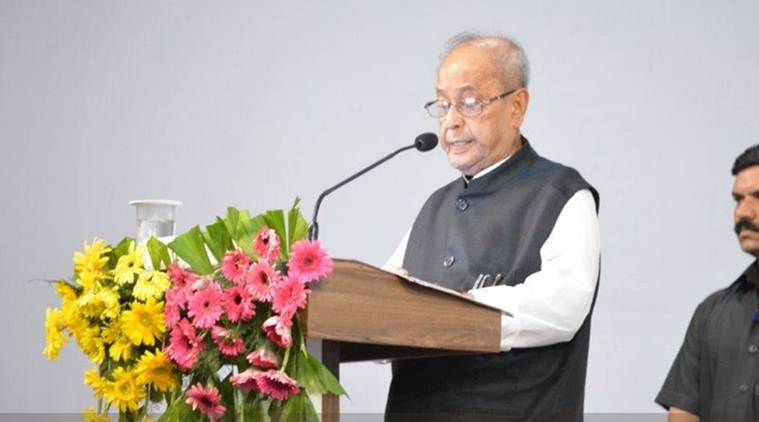 Former President Pranab Mukherjee at the RSS headquarters in Nagpur on Thursday. (Twitter/@RSSorg)
Former President Pranab Mukherjee at the RSS headquarters in Nagpur on Thursday. (Twitter/@RSSorg)
Asked about his tweet, Sharma said he stood by what he said as the images — of no rendition of national anthem and absence of national flag — from the RSS headquarters and what Mukherjee wrote in the visitor’s book about RSS founding Sarsanghachalak Keshav Baliram Hedgewar, calling him a “great son of Mother India”, were “disturbing”. “After all, they opposed the freedom struggle,” he said. “But the question now is whether the RSS will absorb what Pranabji has said.”
But not all were convinced in the opposition and in the Congress. “It is perplexing that in the history capsule that Pranab Mukherjee delivered at the RSS headquarters, there is no mention of Mahatma Gandhi and his assassination. It speaks volumes. He referred to Nehru, Patel and Tagore… how come Gandhi is missing,” CPM general secretary Sitaram Yechury told The Indian Express.
Many in Congress still held that it was the RSS that gained because of Mukherjee’s visit. “The speech is irrelevant because that is hypocrisy. What matters is that he went to the sanctum sanctorum and bowed,” a senior leader said. “The parade, drill… what RSS does reached every drawing room today because of his visit,” said another leader.
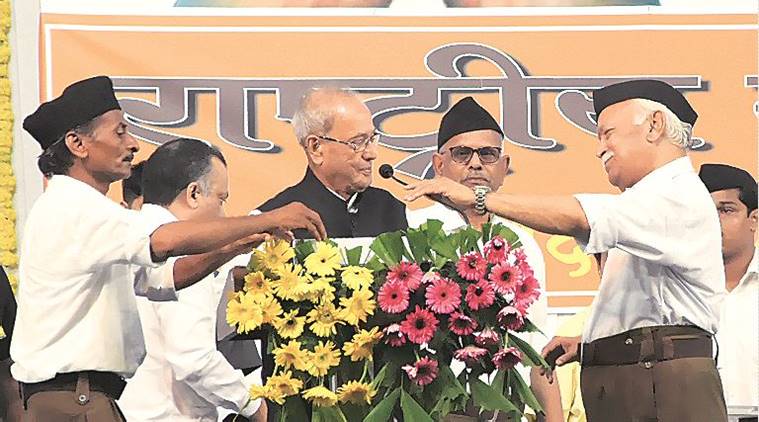 Former president Pranab Mukherjee with RSS chief Mohan Bhagwat at the closing ceremony of ‘Tritiya Varsha Sangh Shiksha Varg’ in Nagpur. Monica Chaturvedi
Former president Pranab Mukherjee with RSS chief Mohan Bhagwat at the closing ceremony of ‘Tritiya Varsha Sangh Shiksha Varg’ in Nagpur. Monica Chaturvedi
Surjewala asked whether the RSS believed that a mere invitation to the former President would give it the “much elusive social and political sanctity”. He, however, said, “Mukherjee has shown the mirror of truth to the RSS at RSS headquarters in Nagpur by reminding them of India’s ‘pluralism’, ‘tolerance’, ‘secularism’ and ‘inclusiveness’ as an article of faith and soul of the country.” He, Surjewala said, highlighted the need of freeing public discourse from all forms of violence, physical and verbal, besides putting compassion, harmony and non-violence as the centrestage of public life.
Surjewala admitted that Mukherjee’s visit to the RSS headquarters had caused “wide-ranging discussion, comment, concern and even consternation amongst a large section of Indians, who have an innate belief in our foundational values of democracy, pluralism, diversity- of cultures, of ethnicity, of languages and of religious practices.”
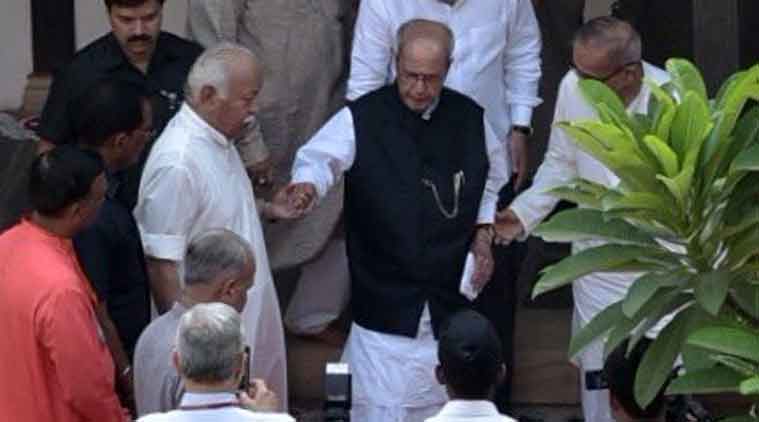
“As Indians and as Congressmen, we encourage and believe in democratic dialogue… Dialogue is possible in a democratic order, with an open mind and willingness to change… Is RSS ready to listen, ready to change, ready to admit its mistakes – both of thought and action, ready to adapt to India’s foundational values of pluralism, tolerance, non-violence, secularism and diversity, give up its prejudice vis-a-vis women, Dalits, backwards, minorities and the deprived, accept scientific temper and rationality and give up its inherent character of subjugation, domination and violence?” Surjewala asked.